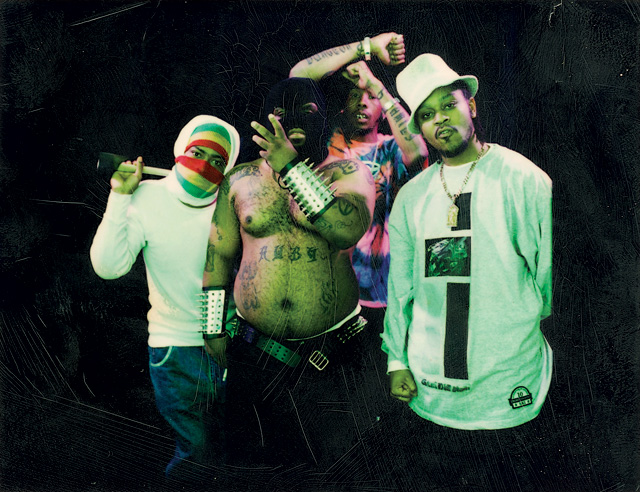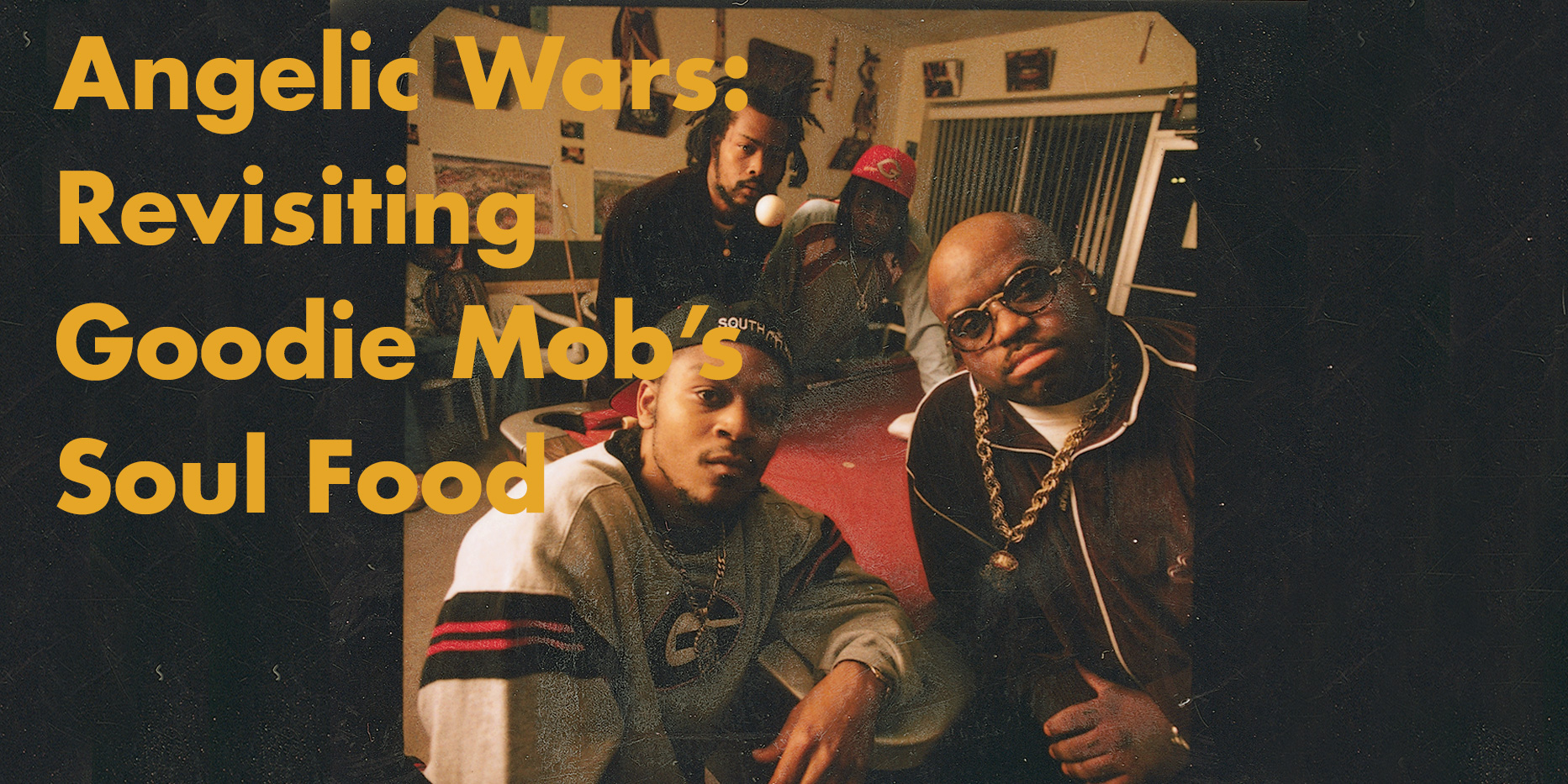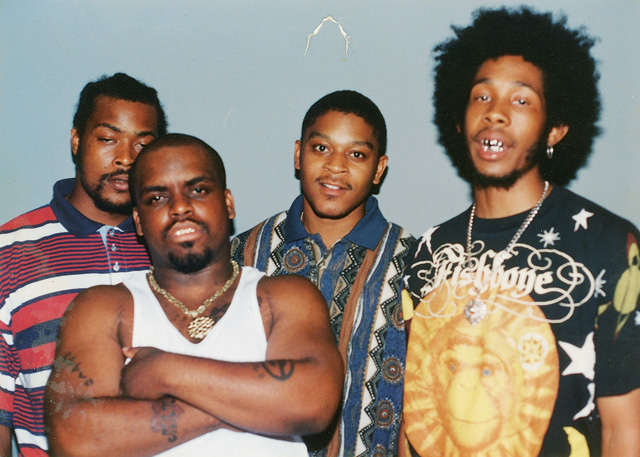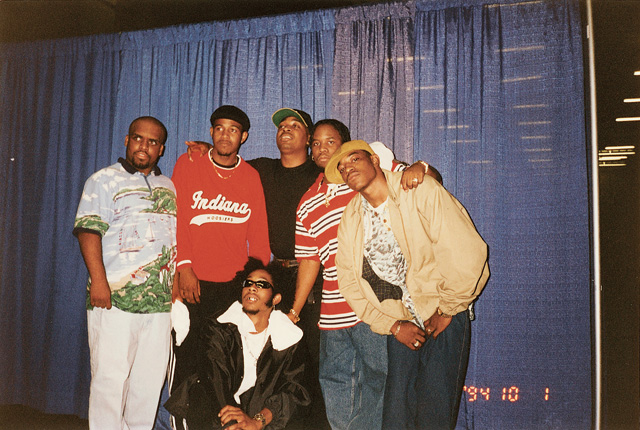The mid-'90s saw the release of an incredible number of important hip-hop albums—Jeff Weiss' Rolling on Dubs column revisits these records around their 20th anniversary, retracing the past through a contemporary vantage point.
It starts in the Southern Baptist church and the red clay soil. It continues in the Dungeon, part tabernacle, part studio—blending voodoo healing rituals, slithering freestyles, and biblical spoken word. It slinks out the S.W.A.T. (southwest Atlanta), 10 miles to Curtis Mayfield's home studio, where
Goodie Mob cooked
Soul Food.
Origins can be corporeal or spiritual. In this case, they're inextricable. To understand why
Soul Food stands up two decades later is like asking why people still revere sacred revelations. These texts are no less profound or unprovable than they ever were. They question the meaning of "truth" until it's unclear whether the gate was put up to keep crime out or keep your ass in. It's less about whether it's the government or the criminals peeking through your window; it's more about realizing that they're often indistinguishable.
We often mock the notion of "struggle rap," but the best rap emerged from the struggle. Yet the first bars of
Soul Food aren't rapped, they're sung: "Lord it's so hard living this life." A weary benediction to the creator,
Cee-Lo's screechy rasp is half-angel, half-devil, gifted and damned. This isn't blues, but it draws from the same poisoned well, feverishly trying to purify. Spirituals from the dirt. The Rhodes that belongs to Superfly. Death isn't knocking at the front door, it's in the house, snacking on the macaroni in the fridge, sitting on top of your chest. Freedom is the only goal. Different demons, same outcome.
OutKast was the face of Dungeon Family, but Goodie was the spine.
Aquemini is the widely hailed masterpiece, but
Soul Food is the vital nerve. The album is everything at once: the feast, the list of secret family recipes, the feeling of standing out in the cold.
Goodie Mob initially referred to T-Mo and Khujo; T-Mo and Cee-Lo had known each other since nursery school. In a 2011 interview, Cee-Lo described his first trip to Organized Noize’s Dungeon headquarters. “I sang and rapped for them and everybody thought it was cool. Then [producer] Rico [Wade] walked in with [OutKast’s] Big and Dré. Dré got real excited like, ‘That’s my man Cee-Lo I told you about, who do them real good story raps.’ Khujo and T-Mo showed up. Khujo was known for being a brawler. Then Gipp pulls up, jumping out a Cadillac, wearing a white lab jacket, because at the time he was attending beauty school, to do hair.”
The arrival came on 1994’s
Southernplayalisticadillacmuzik. Cee-Lo won
The Source’s Hip-Hop Quotable with his debut verse on
“Get Up, Git Out”. It established a worldview—trafficking in dualities and skeptical of extremes. (“I get high but I don’t get too high.”) It’s not just the conventional Christian cycle of sin and penitence, but the seeker’s quest for divine revelation. This is faith in its purest form, constantly tested but never abandoned.
Even though the quartet’s chemistry was obvious, the idea to form as one came only after LaFace Records head L.A. Reid dangled the prospect of a deal. They planned to split into separate entities afterwards, but it didn’t happen until 2004’s high water mark of saltiness,
One Monkey Don’t Stop No Show.
Goodie Mob in the mid-'90s, from left: Khujo, Cee-Lo, T-Mo, Big Gipp
The label expected
Southernplayalistic II and it got
Paradise Lost in East Point. Until OutKast, most rap from Atlanta focused on the booty shake. After MC Shy D and Kilo Ali fell from fame, Jermaine Dupri jacked G-Funk for Kriss Kross and "Funkdafied". Tag Team scored a smash by sanitizing bass music. There was Arrested Development, obsolete even before the Fugees rendered them superfluous. There was the TLC of the condom eye patch era. Then there was Goodie Mob, ancient by the time they were in their early 20s.
All the wisdom is on
Soul Food. Maybe it was Dungeon poet Big Rube, bellowing parables in their ear. It could’ve been the spirit of Curtis, still alive, but paralyzed, threatening to barge in on the proceedings at any time.
"We were taught hip-hop from men: Melle Mel, Grandmaster Flash, Dougie Fresh, Kurtis Blow," Big Gipp told NPR a couple of years ago. "I learned more from Chuck D than I learned from school at the time." In a radio interview earlier this year, T-Mo picked up this thought: “We never made little-kid rap, always grown man stuff. We felt like we were chosen to say something."
Goodie Mob's Cee-Lo and Big Gipp, Chuck D, and OutKast circa 1994
When I first heard
Soul Food shortly after its release, I loved it, but didn't understand it. It's easy to drown in the humid organ funk, the ecumenical harmonies, the rawness and technical skill of the four voices attacking like a Southern Wu-Tang or Public Enemy. There’s thematic precedence in Poor Righteous Teachers and Brand Nubian, and Cee-Lo was a big fan of Busta Rhymes, Onyx, and Slick Rick.
But Goodie Mob betrays no direct ancestor. It's soul music gone to seed, fighting to ascend once again. If they can't make little-kid rap, it's because every song has consequences. You understand it better as an adult, because you've processed loss and tragedy. The genius of
Soul Food is its ability to remind you of the damage, but offer the strength to hold on.
There's Cee-Lo starting off his verse about being $20 away from living on the streets and offering an idea that seems radical and alien in our culture 20 years later: "It would be nice to have more, but I kind of like being poor, at least I know what my friends here for."
If you can forget “The Voice” appearances and the damning Twitter comments, we'll always have
Soul Food as the still life. Cee-Lo is the son of Baptist preachers, himself named for a minor sin, transvertebrating in the trap, possessed by something that might never return, vision blurry from crime, hounded by his own demise. Other than Biggie and Pac and Scarface, mortality had rarely been so starkly confronted. He's fatalistic but positive. If you're looking for the roots of the last two Kendrick albums, this is probably the most direct analog.
But there's no substitute for the clarity of these proverbs. If K.Dot strove to make his revelations oblique, Goodie opted for equally radical and introspective simplicity, putting the Clampett's and cross burners on the run. They're acutely aware of the cycle they're trapped in, but determined to learn lessons and derive strength from their surroundings.
In this music is the feeling of acid eating away your intestines when you can't afford to eat. It's the salvation and abundance of Sunday feasts, a heaping plate of soul food, chicken rice, and gravy. When these men rapped about food, it's like Henry Miller writing down the meals that he dreams of being able to afford eating.
"Soul food is gut food. It's food that sticks to you,” Bun B told NPR in 2009. “So if you want music that's not just being made to get your money but that’s being made to really inspire you, then
Soul Food is that album."
The Dirty South comes from here. The Mob knew Bill Clinton was dirty years before Monica Lewinsky. Cool Breeze and Big Boi breaking down the rules, the warped education, the lies and the ability to correct them. It was originally the East Point native's song, but it was repurposed for the collective mission.
"Thought Process" thumps like a jeep on a dirt road, T-Mo looking for some change to survive. Combing the city streets, trying to get paid and keep his head from swerving. His consciousness doesn’t stem from self-righteousness, but out of pain. He attended too many funerals before he could grow facial hair. Khujo is in the trap, one of the first times the phrase ever appeared on a major record. In this context, it's explicit: trap or die, a decade before.
"Cell Therapy" was their biggest hit, Orwell filtered through William Cooper's Illuminati conspiracy, glockenspiel, and Sega. In the mouths of Goodie Mob, it all makes sense. It’s a record that celebrates community and the exposing of lies. The drug-free signs contradicted by the Bloods hanging out at the store. It's a call to arms and a request for salvation, praying in the shower and then heading out into mud.
Other than arguably
The Chronic, no rap album had ever been this organic and musical. The samples are few, the funk is rolling. It’s the feeling of being seized by something intangible and inaccessible. Ancestral spirit, echoing through minor-key pianos and accidental seances. Cee-Lo's verse on "Guess Who" is dedicated to his recently deceased mother. He leads the choir, the first time that singing was ever incorporated so seamlessly. It’s an unofficial sequel to "Dear Mama". No surprise that 2Pac was allegedly obsessed with Goodie Mob, allegedly wanting to join the group.
The album will last forever because it strikes those universal chords. It’s Bob Marley wailing for Zion. 2Pac searching for God and finding the Devil. Son House moaning about his death letter—the ghosts sulking over the burned land and the drugged searchers seeking hope in southwest Atlanta. It's an indictment of the cheating wrought by the government, a call for unity and peace—repentance for the sins and a requiem for those laid to rest. If their peers filled their albums with comic skits and violent schemes, Goodie Mob literally featured funerals. They warned against the New World Order long before it was a #StayWoke hashtag.

The first half of the record gets most of the attention. It has the hits, the most vivid slang, and the material that Goodie Mob actually still plays when Cee-Lo deigns to tour with them. But it's perfectly sequenced to the final curtain calls. T-Mo's verse on "I Didn't Ask to Come" contains opening bars as powerfully conceived as any in rap history: "Every day somebody gets killed/ What the deal/ It's 1995 and a nikka want to live."
Every line slaps like a premonition. They are priests, witchdoctors, ordinary men, virtuosos, trappers, and teachers trying to give the noose under their necks a little slack. Ready to roll up in the White House with an axe until they're ready to give them their shyt. Cold and stressed like a man sitting on pavement under a bridge on I-20 West. Struggling and fighting to stay alive, hoping that one day they get a chance to die.
You can see the significance of Goodie Mob in anyone impacted by Dungeon Family, which is essentially everyone. The dark glass divinations of “Cell Therapy” are ubiquitous in our daily lives. But
Soul Food taps most deeply into the roots of the past. They carried on the legacy of not just James Brown and Curtis Mayfield, but Martin Luther King and Medgar Evers and Rosa Parks and Emmett Till and all those who never got the chance to offer testimony. It worships the richness of the culture that blossomed in spite of constant oppression. If the South had something to say, this was its most coherent statement—musically, spiritually, philosophically.
It ends with "The Day After", the only way it could. It's 1995, a year before the New South starts to take root with the Atlanta Olympics. Goodie Mob's debut is there to usher in this new era and remind us of the old corruption. The sins of the past are revisited and recounted. Somehow, the hope for the future is never entirely dimmed.
They saw this dirty world filled with surveillance at every angle, but their desire to transcend refused to be extinguished. If the city is merciless, the harsh realities innate, the good dead over bullshyt, T-Mo, Gipp, Khujo, and Cee-Lo reveal the path directly in front of our eyes—the one that we can never clearly see. They offered freedom for the famished, soul for anyone in possession of such a thing.
Rolling on Dubs: Angelic Wars: Revisiting Goodie Mob’s Soul Food



 , when they contributed Hip-Hop CLASSICs
, when they contributed Hip-Hop CLASSICs





